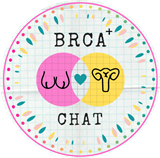My next VIP Mutant, Charlie Morgan talks about the prevalence of the BRCA mutation within the Ashkenazi Jewish population. She also considers how this has impacted her as a Jewish woman. Charlie has been working incredibly hard in the BRCA community to raise awareness, she founded The BRCA Project and is always looking to share your personal stories, so please get in touch.
“The general population have a 1 in 400 chance of carrying a BRCA mutation. In the Ashkenazi Jewish population – Jews with Eastern European heritage – research suggests that the risk is as high as 1 in 40. What this means for Jewish people across the world is that we are, or should be, much more aware of our bodies and how we might spot the signs of breast, prostate, or ovarian cancer. The bigger picture is that young Jews need to start taking responsibility for reducing prevalence of the gene mutation in future generations.
The most likely reason for such an increased risk is that our communities have historically been very insular, so the gene pool never had much of an opportunity to grow. Some historians say that the 10 million Ashkenazi Jews who live all over the world today descended from just 350 people, who lived around 700 years ago. The same traditions continue today – my mum has always expected that I would end up with someone Jewish, and she never fails to ask me about the religious background of each date (“What about a Jewish grandparent? So they have no Jewish family at all?!”). So much of Jewish culture is about preserving our traditions for the next generation. But, when you take genetic mutations into account, this becomes much more complicated.
My own journey with a BRCA2 mutation so far has not related to my hypothetical children (what a relief!). I underwent a preventative mastectomy in 2019 at age 22. The 18 months between diagnosis and surgery was intensely emotional – I’d never before had to consider my future, and suddenly was faced with statistics that shaped my life in intervals of risk. After successfully reducing one of my major cancer risks, I now plan to have surgery to remove my ovaries after I’ve had children, in around 15 years. BRCA isn’t the only genetic mutation with an increased risk for the Jewish community – there are a whole spectrum of others, such as a severe neurological disorder called Tay Sachs Disease – so me and my future partner will likely undergo further testing before kids. But BRCA definitely feels the most urgent to me; I want to make sure that my children don’t experience the same uncertainty, or feel just as alone as I did, when I got my diagnosis.
Awareness around BRCA has changed so much in just a few years. There are now amazing communities of BRCA carriers popping up on social media, and were getting regular representation in the press. At the same time, new scientific research means that the routes for treatment of BRCA-related cancer risks will have developed in amazing ways in the future. BRCA2 was only discovered 25 years ago. So, by the time I have kids, it’s likely that they’ll be offered a totally different set of options. I can’t wait to see what that future looks like.
It’s difficult to quantify how being Jewish has affected my BRCA journey so far. There are brilliant organisations like Jnetics which advocate for genetic testing in the Jewish population. They do amazing work supporting couples through the testing process before they start their families. But, being just 20 when getting my diagnosis, I hadn’t come across them before. Instead, I think my Jewish community has impacted my BRCA journey by supporting me in a more abstract way. I’ve always been surrounded by confident (and loud) Jewish women – including my own exceptional mum – and they’ve given me a really good sense of what it means to be a Jewish woman. And, thankfully, it has absolutely nothing to do with my boobs. It comes from strength, independence – and chutzpah. From the outset, my Jewish friends and family supported my decision to undergo elective surgery with humour and an enormous outpouring of love: both things that my community does best. For that, I’ll always be grateful”.
Thanks so much Charlie for sharing your knowledge and personal experiences. If you have any questions for Charlie please contact her via her Instagram The BRCA Project.


